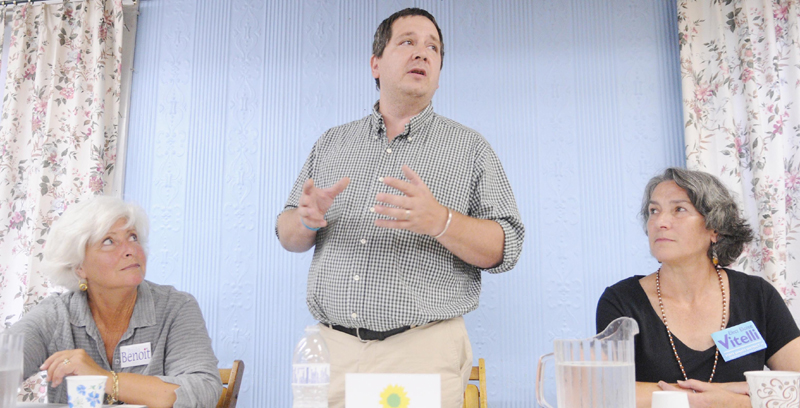RICHMOND — Ahead of a Tuesday special election, the three candidates for an open Maine Senate seat took questions at a Wednesday forum at the town Grange hall from constituents, some frustrated by what they see as federal overspending and broken state promises.
Next week, voters in Sagadahoc County and Dresden will choose a new senator from among three candidates to serve out the term of former Sen. Seth Goodall: Republican Paula Benoit, of Phippsburg; Democrat Eloise Vitelli, of Arrowsic; and Topsham’s Daniel Stromgren, a member of the Green Independent Party.
Goodall, a Richmond Democrat first elected to the Senate District 19 seat in 2008, resigned in June after he was appointed Northeast director of the Small Business Administration by President Barack Obama.
With Goodall, Democrats held 19 of 35 seats in the Maine Senate.
A return to office for Benoit, 58, a former businesswoman who held the seat for two years before Goodall beat her narrowly in 2008, would give Democrats the slimmest possible majority in the body.
Vitelli, 64, is no political newcomer, as she works as policy director for Woman, Work and Community, a statewide group focused on improving the standing of women in business. She also chaired the Sagadahoc County Democrats from 2004 to 2008.
She cited education and economic development as her goals in the Legislature, saying the state must “invest in Maine people so that we have the skills and the knowledge to keep this state moving forward.”
Stromgren, 40, a social worker, pitches himself as a pro-business, somewhat conservative Green, balancing business interests between environmental protection and social justice.
“At some point, we ended up becoming Greens, Republicans and Democrats,” he said. “We need somebody to go to Augusta with an idea of bringing unity.”
After opening statements at the Wednesday evening event at the hall on Alexander Reed Road, the approximately 30 attendees were allowed to ask questions of candidates.
Richmond Selectman Peter Warner asked each about their positions on the effect of state reductions of aid to cities and towns passed in the last two-year budget, saying property taxes in the town increased as a result.
By law, the state is supposed to give 5 percent of sales- and income-tax revenue to cities and towns, but the state has scaled that back in recent years.
In his proposed budget for the current two-year cycle, Gov. Paul LePage suggested eliminating the aid altogether. The budget that passed restored nearly two-thirds of that money, leaving municipalities on the hook for the rest.
Benoit said spending on welfare programs has crowded out funding for programs such as revenue sharing, using an anecdote from going door to door on the campaign trail, where she said she saw a young person “in their pajamas at 1 o’clock in the afternoon watching TV.”
“Why are they not working when you’ve got an elderly person that lives just the street that could use some help?” she said. “It’s a myth if people think that there’s money up there just sitting, waiting to be passed out to the towns.”
Vitelli said it is “important that the state keep to its promises” on revenue sharing and school funding so cities and towns aren’t left to make up the difference.
Stromgren said to support underfunded state programs, lawmakers must target bureaucracy in state government and education, citing school administrative systems he sees as top-heavy with high executive pay.
On whether to accept federal money to expand MaineCare, the state’s version of Medicaid, the health care system for the poor, Vitelli and Stromgren said they would support it, saying the state or hospitals will pay for health care for those who need it even without expansion.
“There has to be a better way,” Vitelli said.
Stromgren cited his work experience, dealing with people who he said need health care who will end up getting state-paid health care or free care from hospitals.
“They’re going to hospitals,” he said. “So we can look at the money we’re paying out or we can look at the money we’re paying for emergency services.”
Benoit was wary of expansion, sharing a view similar to that of LePage, who successfully vetoed the legislation to do so earlier this year. The Maine Department of Health and Human Services has seen cost overruns in the MaineCare program for years.
She said she didn’t believe the federal government would assist states in funding expansion more than three years, calling it “a very slippery slope” putting the state on the hook for future costs.
Candidates also were asked where they agree on issues with LePage. While Stromgren and Vitelli agreed with his focus on domestic-violence issues, for example, they particularly criticized his blunt-speaking manner, which often leads to controversy.
Benoit said while she appreciates and agrees with LePage’s fiscal conservatism, she said her personal style doesn’t match his.
“I understand that he sees the light at the end of the tunnel as a businessperson,” she said. “I would not take the approach in the press that he does.”
Michael Shepherd — 370-7652
mshepherd@mainetoday.com
Send questions/comments to the editors.



Comments are no longer available on this story